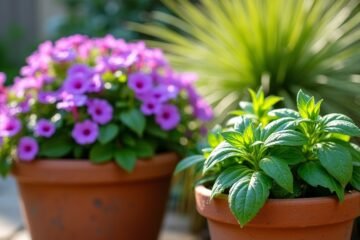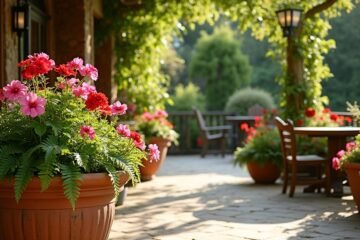Getting fresh herbs on your urban balcony is easier than you think! Choose lightweight containers like terracotta or recycled plastic, around 10 to 12 inches wide, for your little greenery buddies. Basil loves the sun, while mint prefers a bit of shade—perfect for that sunny spot or cozy corner! Keep the soil mix rich and fluffy, ensuring good drainage. Water them just right, and soon enough, your balcony will be a tasty slice of paradise! Want to know more?
Choosing the Right Containers for Your Herbs
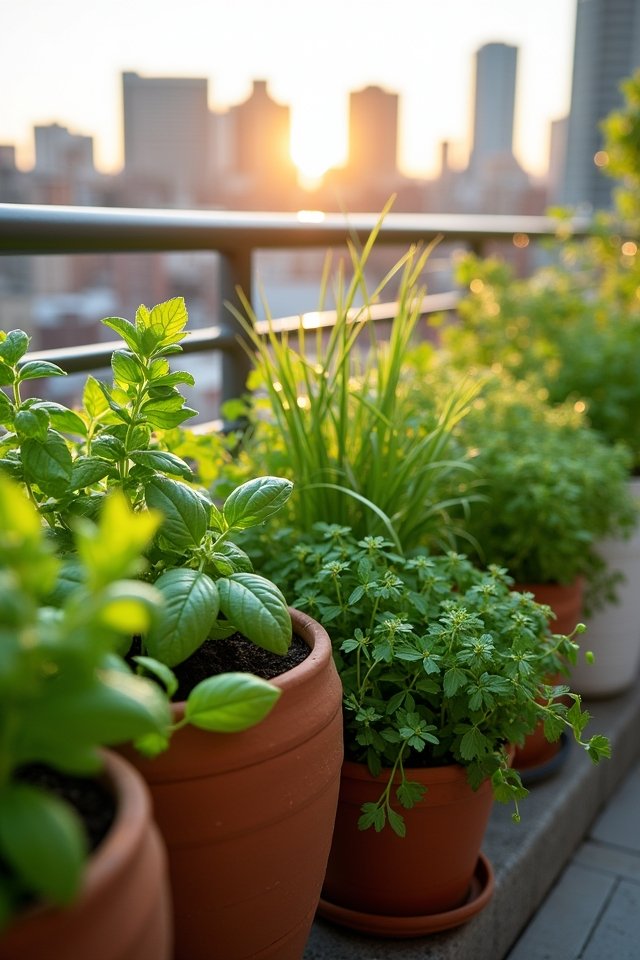
When it comes to growing fresh herbs on your balcony, the right container can make all the difference! Imagine vibrant basil or aromatic thyme thriving in chic pots that reflect your style. You’ve got options! Choose lightweight container materials like terracotta or recycled plastic, which not only look great but also drain well. For pot size, a medium-sized container—think 10 to 12 inches—gives your herbs room to spread their roots while staying manageable. Plus, they’ll bring a pop of color to your balcony! Just remember, too small a pot can lead to sad, wilting leaves. So, pick containers that not only suit your space but also make your herbs sing with joy! Ready to transform your balcony garden? Let’s go!
Selecting the Best Herbs for Urban Balconies
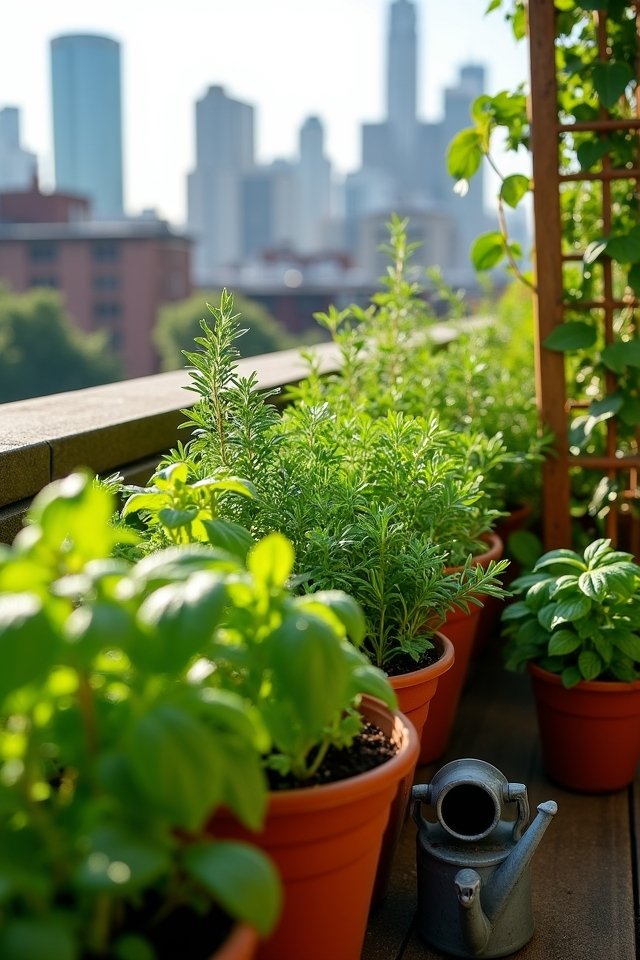
Are you ready to spice up your balcony with the perfect herbs? Choosing the right herb variety selection is key! If your space basks in sunlight, think about vibrant basil or zesty rosemary, which thrive in bright conditions. Got a shadier spot? Try mint or parsley—they’ll gladly soak up indirect light.
Don’t forget climate considerations! In a cooler area, consider hardier herbs like thyme or chives that can brave the chill. And remember, your balcony isn’t just another garden; it’s your culinary oasis! Picture snipping fresh oregano for a homemade pizza or fragrant cilantro for a zesty salsa. With the right herbs, your balcony can be an aromatic wonderland, transforming every meal into a delightful feast! What are you waiting for?
Soil and Drainage Tips for Container Gardening
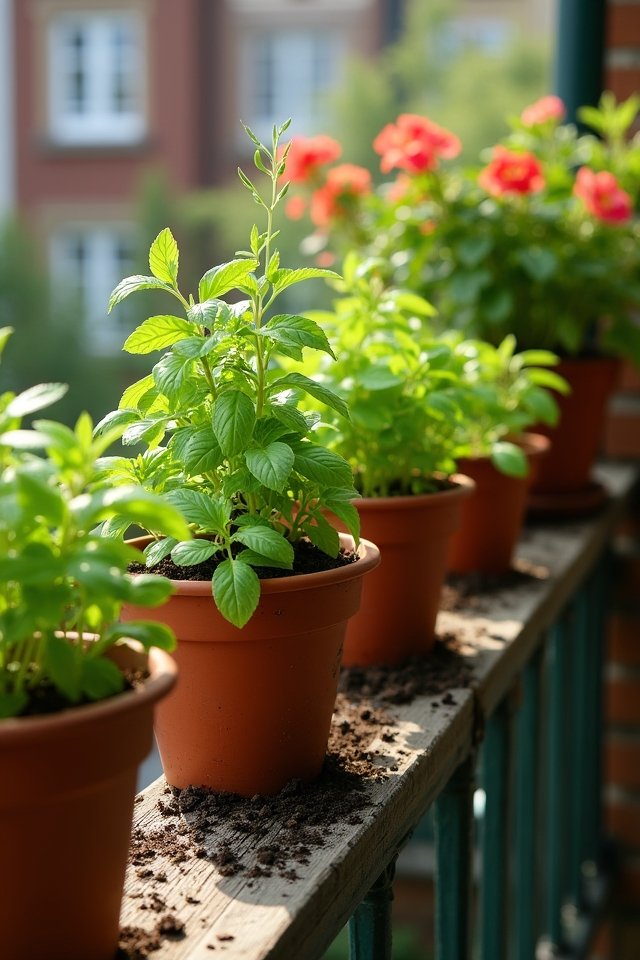
Choosing the right herbs is just the beginning of your balcony garden adventure! To set your leafy friends up for success, focus on soil composition. A mix of potting soil, perlite, and compost works wonders, creating a fluffy, nutrient-rich environment for growth. It’s like giving your herbs a cozy bed to snuggle into!
Now, let’s talk drainage methods. Make sure your containers have holes at the bottom—think of them as tiny escape routes for excess water. You can also add rocks or gravel at the base to enhance drainage, preventing soggy roots. Remember, happy herbs thrive in well-drained soil! With these tips, your balcony will be a vibrant herb haven in no time! Ready to dig in?
Sunlight Requirements for Healthy Herb Growth
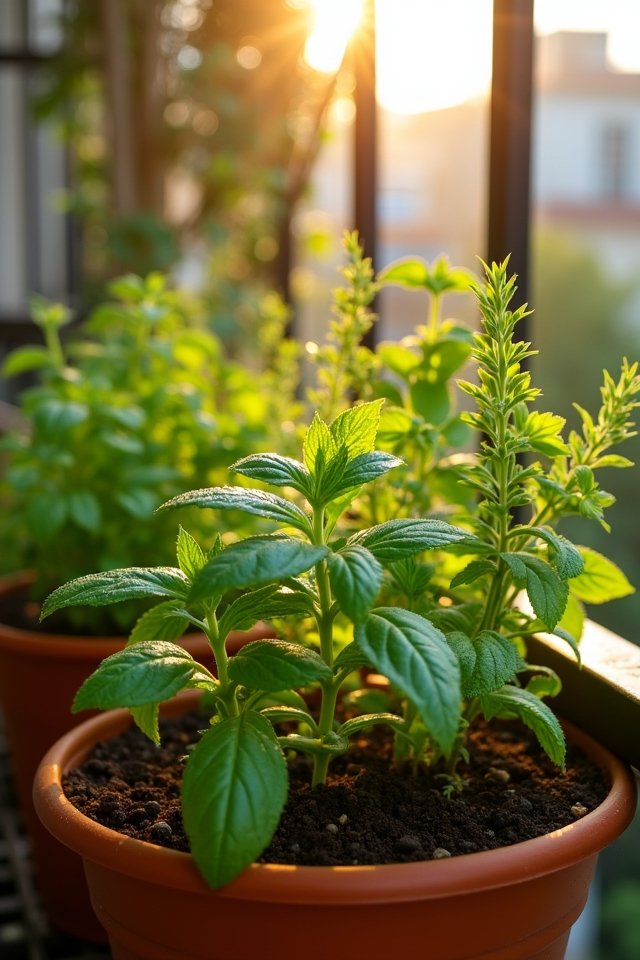
How much sunlight do your herbs need to thrive? Well, think of sunlight as a warm hug for your plants! Most herbs crave at least 6 to 8 hours of direct sunlight daily. Position your pots where sunlight angles dance across them, ensuring they soak it up like enthusiastic sponges! Watch for herb shadows; they’ll tell you if your plants are stretching too far or getting too little light. If you see them leaning, that’s a sign they’re reaching for the rays! Consider rotating your pots occasionally, giving every herb a fair share of that glorious sun. With the right sunlight, your balcony will bloom with vibrant greens, and your culinary creations will taste like magic! Don’t let those herbs go without their daily dose!
Watering Techniques for Balcony Herb Gardens
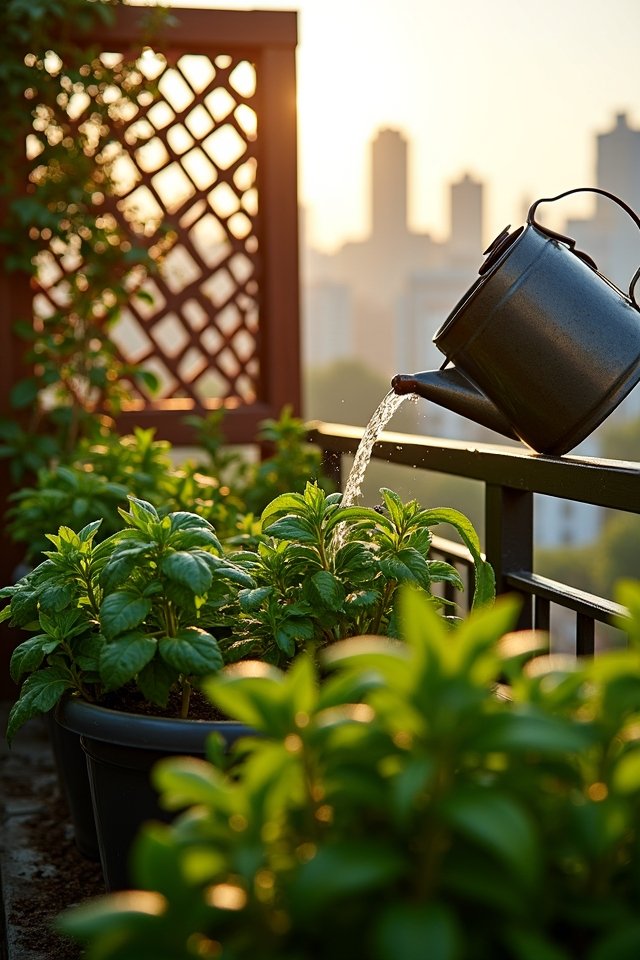
When it comes to watering your balcony herb garden, think of it as a delightful dance! You want to keep those herbs happy and hydrated without drowning them. Consider using drip irrigation systems—they’re like a gentle rain, delivering just the right amount of water directly to the roots. This method not only saves time but also boosts moisture retention, ensuring your herbs flourish.
Don’t forget to check the soil regularly. If it feels dry an inch down, it’s time to dance again! And remember, herbs like basil and mint thrive on consistent moisture, while others, like rosemary, prefer a bit of dryness. So, welcome the rhythm, and your balcony will transform into a luscious herb haven!
Fertilizing Your Herbs for Optimal Flavor
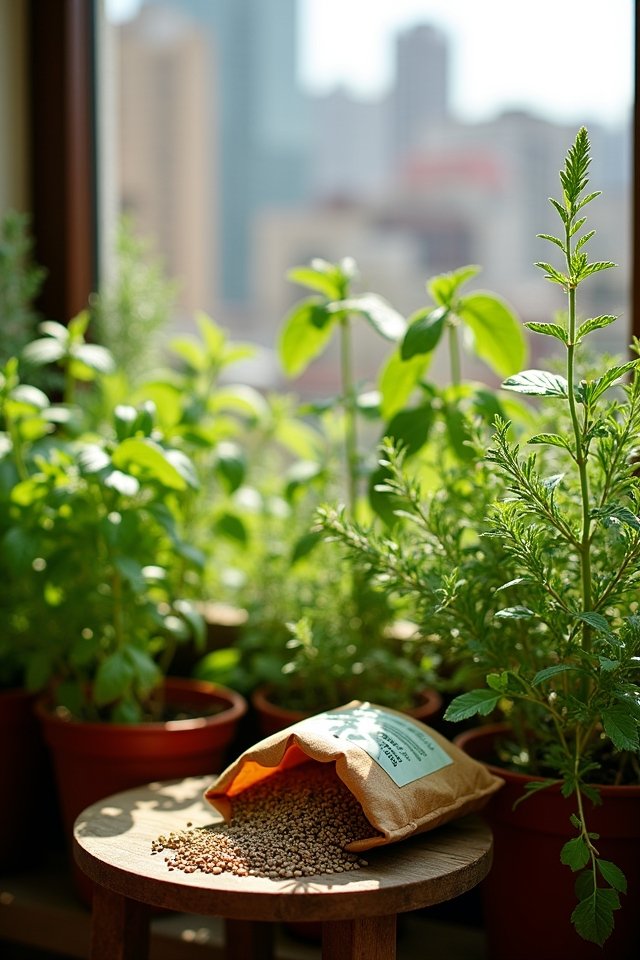
While you might think that all herbs need is sunlight and water, a sprinkle of fertilizer can transform your culinary garden into a flavor-packed paradise! To kick your herbs up a notch, consider using organic fertilizers, like compost or fish emulsion. These magical potions boost nutrient balance, allowing your herbs to flourish with zest. Just imagine the aroma of basil wafting through your kitchen, a true delight!
Apply a diluted organic fertilizer every four to six weeks during the growing season, and watch your herbs thank you with vibrant growth and richer flavors. Remember, too much of a good thing can be a bad thing, so stick to the recommended amounts. Your taste buds will celebrate the difference!
Maintaining and Harvesting Your Urban Herb Garden
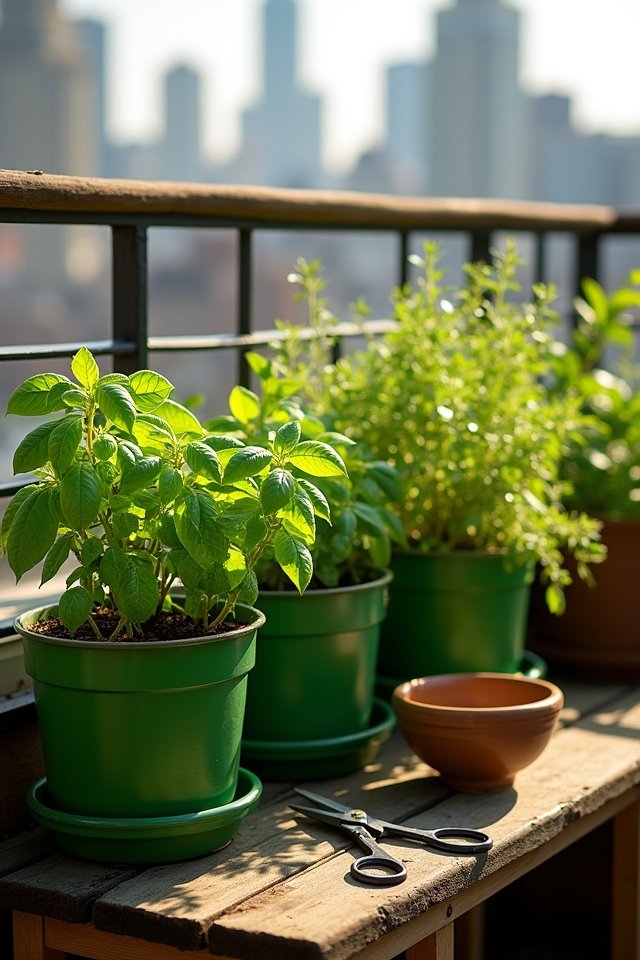
After giving your herbs a tasty boost with that organic fertilizer, it’s time to nurture and harvest your little green treasures! Keep an eye on their growth—snipping off the tips with sharp scissors can encourage bushier plants, thanks to clever pruning techniques. Plus, it’s like giving your herbs a stylish haircut!
Watch out for pesky insects; they can turn your green paradise into a nightmare! A gentle spray of soapy water does wonders for pest control, keeping your herbs thriving and healthy. When it’s time to harvest, pluck those fragrant leaves early in the morning for maximum flavor.
Frequently Asked Questions
Can I Grow Herbs Indoors if I Don’t Have a Balcony?
Absolutely, you can grow herbs indoors, even if you don’t have a balcony! Think of your kitchen as a mini jungle! With some indoor gardening magic, you’ll need herb lighting to mimic that glorious sun. A bright windowsill works wonders, too! Imagine plucking fresh basil or mint right from your countertop! Just make sure to water them right and let your herbs thrive in their cozy little home! How delicious does that sound?
How Do I Prevent Pests From Damaging My Herbs?
To prevent pests from munching on your precious herbs, try natural pest control! You can use essential oils like peppermint or neem spray—bugs hate ’em! Companion planting works wonders too; for instance, plant basil near tomatoes to keep those pesky aphids away. Plus, who doesn’t love a garden that smells amazing? Keep an eye out for any unwelcome guests, and you’ll guarantee your herbs thrive beautifully! Happy gardening!
Can Herbs Survive Winter on My Balcony?
Can herbs survive winter on your balcony? Well, it’s not a winter wonderland for them! With proper winter herb care, they can thrive like cozy sweaters in the snow. Insulate your pots with bubble wrap or straw—think of it as a warm blanket! Place them in a sheltered spot to shield them from harsh winds. Just imagine fresh basil or thyme ready to brighten your winter meals! Who wouldn’t want that?
Are There Specific Herbs That Repel Insects?
When you think about herb selection for insect deterrents, consider planting mint, basil, or rosemary. These fragrant wonders don’t just spice up your meals; they also send pesky pests packing! Imagine sipping tea infused with mint, while mosquitoes flee in terror! Basil’s sweet aroma keeps flies at bay, and rosemary is like a protective shield against unwanted critters. Who knew your little garden could double as a stylish bug bouncer?
How Can I Propagate My Herbs for More Plants?
Ah, the art of propagation! You can easily expand your herb collection with simple herb cuttings. Just snip a healthy sprig, remove the lower leaves, and pop it in a glass of water. Watch as those roots sprout like magic! Keep it in bright light and change the water weekly. In no time, you’ll have new plants sprouting like wildflowers. Isn’t it thrilling to nurture life from just a cutting? Happy gardening!
